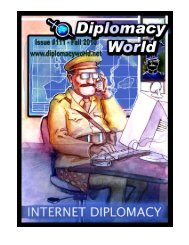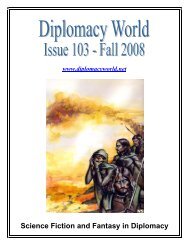Diplomacy World #121, Spring 2013 Issue
Diplomacy World #121, Spring 2013 Issue
Diplomacy World #121, Spring 2013 Issue
You also want an ePaper? Increase the reach of your titles
YUMPU automatically turns print PDFs into web optimized ePapers that Google loves.
Allan Calhamer: A Retrospective<br />
By Edi Birsan and Larry Peery<br />
It is good to see Allan finally get the recognition he so<br />
richly deserves for his creation <strong>Diplomacy</strong>. In the past<br />
few weeks scores of tributes to Allan have appeared all<br />
over North America and even beyond. A Google search<br />
reveals a long and growing list of Calhamer obits,<br />
remarkable not only for its length but also the diversity of<br />
sources. Many of those were republications from the<br />
Associated Press’s stock obituary file. Others were<br />
based on the excellent “All in the Game” story Edward<br />
McClelland wrote some years ago for The Chicago<br />
Magazine. Closer to Allan’s home tributes appeared<br />
from both the great (The Chicago Tribune, 4 March<br />
<strong>2013</strong>, by Joan Giangrasse Kates) and the small (The<br />
LaGrangePatch (by Darren McRoy). Among others<br />
worth a look are: “Allan Calhamer Dies at 81; Invented<br />
<strong>Diplomacy</strong> Game” by Margalit Fox, New York Times, 6<br />
March <strong>2013</strong>; “<strong>Diplomacy</strong>: The Map That Ruined a<br />
Thousand Friendships,” by Henry Grabar, The Atlantic<br />
Cities, 7 March <strong>2013</strong>; Even POLITCO, the Washington<br />
Insiders’ news and gossip source picked up the AP<br />
story, as did The Huffington Post. Word of Allan’s<br />
passing spread quickly in the internet community as well.<br />
The first word overseas came from The Telegraph in the<br />
UK (16 March <strong>2013</strong>). Truly, Allan may be gone but he’s<br />
not been forgotten.<br />
Edi and I knew Allan for nearly a hundred years between<br />
the two of us, and we thought we’d share some of our<br />
memories of the man we both called mentor and friend,<br />
Edi focusing on Allan skills (or lack thereof) as a game<br />
designer and player; and I focusing on the man many in<br />
the hobby never got to know.<br />
There were two questions we wanted to answer in<br />
writing this. First, how could a man who was so<br />
extraordinarily ordinary in so many ways create this one<br />
artistic masterpiece? Second, how could a man who was<br />
so quiet stir up such a frenzy among his fans?<br />
Edi notes that he probably played with him more times<br />
than most. I, on the other hand, can’t recall ever actually<br />
playing <strong>Diplomacy</strong> with Allan. Edi got to know Allan<br />
across the Dip board. I got to know him in spite of it.<br />
Edi writes: he was always very soft spoken and low<br />
keyed and never spoke ill of anyone regardless of the<br />
insanity on the game board or around him.<br />
Larry comments: It’s true. He was so soft spoken it was<br />
sometimes hard to hear him even if you were sitting next<br />
to him. You really had to listen to hear what he had to<br />
say, difficult at times but always worthwhile. Nor can I<br />
recall ever hearing him say anything bad about anyone,<br />
although he wasn’t above sticking a pin in an overstuffed<br />
balloon once in a while. I can only recall one time<br />
when I actually saw Allan agitated. More on that later.<br />
Edi: He saw the game in more of a social context with<br />
the expectations that most games would be called on<br />
time and the “what if” situations discussed. He believed<br />
in the concept that as long as you were alive you could<br />
come back and “win” and that all participants were<br />
equal. With the development of the postal hobby and the<br />
advance of a multi-game scoring concept demand, he<br />
admitted that he tried one system sort of as a challenge<br />
with the idea of what to do with a tournament and time<br />
limited games that were forced to “unnatural” endings.<br />
The resultant system he designed (his only attempt at it)<br />
was so complicated and unsatisfactory to himself that he<br />
just left it and never went back to try to make a “perfect”<br />
scoring system.<br />
Edi: When he worked on the game there was a lot of<br />
work done on the design of the map more than any other<br />
aspect of the game. That the map has remained<br />
unchanged in 54 years (Larry notes: That original map<br />
has inspired hundreds, if not thousands, of variants over<br />
the years covering just about every historical period and<br />
geographical locale.) and no one has come up with a<br />
better alteration is a testament to his process and focus.<br />
The fundamental rules have been only changed in the<br />
most minor of points with the exception of the alternate<br />
convoy rule and the shutting down of the unintended<br />
abuse of the convoy rules called the Unwanted Convoy.<br />
Edi: We had many discussions on the finer wording of<br />
the rules and several aspects we worked on for the last<br />
major rewrite of the rules together: the 1999 Hasbro set<br />
with the metal pieces. By the way, the original set in<br />
1959 was supposed to have metal pieces as well with<br />
battleships like the Monopoly piece and cannons for the<br />
armies. The cannons were to be two wheeled versions<br />
of the French 75 but the company that was to make<br />
them went out of business and he had to scramble for a<br />
substitute and came up with the wood block pieces.<br />
Larry: Allan produced the first 500 copies of <strong>Diplomacy</strong><br />
himself and sold them primarily through an ad in The<br />
Atlantic magazine for all of $7.00. Allan quickly realized<br />
he wasn’t cut out to be a businessman and John R.<br />
Moot, who passed away in 2009, took over publishing<br />
<strong>Diplomacy</strong> with his GRI Company in Boston. But it was<br />
when <strong>Diplomacy</strong> became part of The Avalon Hill<br />
Company’s family of games that <strong>Diplomacy</strong> really took<br />
off. Here again Allan found a fan in Rex Martin who<br />
promoted the game early on. Early buyers were<br />
enthusiastic but soon ran into the challenge of finding six<br />
other players with the time and space to play a game.<br />
John Boardman’s GRAUSTARK published the first<br />
postal <strong>Diplomacy</strong> game in 1964 and the postal hobby<br />
<strong>Diplomacy</strong> <strong>World</strong> <strong>#121</strong> – <strong>Spring</strong> <strong>2013</strong> - Page 10




